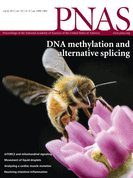PNAS: 生命早期的食物缺乏降低在饥荒中的健康程度
一项研究发现,胎儿期和新生儿时期的营养不良会在之后的食品缺乏时期降低人的健康程度。Adam D. Hayward及其同事检验了“预期适应反应”(PAR)假说,该假说寻求解释在那些于生命早期遇到过食物缺乏的成年人中常常能观察到的代谢疾病的高发生率,该假说假定这类个体有一种“节俭的代谢”,如果在以后遇到缺乏食物的情况,这种机制就会带来进化优势。这组科研人员分析了在1866-1868年间发生在芬兰的一场灾难性大饥荒之前50年芬兰东南部两个教区的3000多人的关于出生、死亡、分娩和社会经济地位的教堂记录。这组作者调查了出生前后年份的由农作物产量决定的食品可供应性与在此次饥荒期间的生存和繁殖之间的关联。对于男性和女性而言,在生命的早期阶段更高的农作物产量都与在饥荒时期的存活的增加有关联;在社会经济地位较低的男性和年轻的女性中间,这种关联更为明显。更高的生命早期农作物产量与女性在饥荒期间的生育力的增加有关联。这组作者说,这些结果支持了“银勺子”假说,该假说提出,生命早期营养不良限制了发育并且没有带来进化上的优势。(生物谷 Bioon.com)
生物谷推荐的英文摘要

PNAS Doi:10.1073/pnas.1301817110
Influence of early-life nutrition on mortality and reproductive success during a subsequent famine in a preindustrial population
Adam D. Haywarda,1,2, Ian J. Rickarda,b,1, and Virpi Lummaa
Individuals with insufficient nutrition during development often experience poorer later-life health and evolutionary fitness. The Predictive Adaptive Response (PAR) hypothesis proposes that poor early-life nutrition induces physiological changes that maximize fitness in similar environments in adulthood and that metabolic diseases result when individuals experiencing poor nutrition during development subsequently encounter good nutrition in adulthood. However, although cohort studies have shown that famine exposure in utero reduces health in favorable later-life conditions, no study on humans has demonstrated the predicted fitness benefit under low later-life nutrition, leaving the evolutionary origins of such plasticity unexplored. Taking advantage of a well-documented famine and unique datasets of individual life histories and crop yields from two preindustrial Finnish populations, we provide a test of key predictions of the PAR hypothesis. Known individuals from fifty cohorts were followed from birth until the famine, where we analyzed their survival and reproductive success in relation to the crop yields around birth. We were also able to test whether the long-term effects of early-life nutrition differed between individuals of varying socioeconomic status. We found that, contrary to predictions of the PAR hypothesis, individuals experiencing low early-life crop yields showed lower survival and fertility during the famine than individuals experiencing high early-life crop yields. These effects were more pronounced among young individuals and those of low socioeconomic status. Our results do not support the hypothesis that PARs should have been favored by natural selection and suggest that alternative models may need to be invoked to explain the epidemiology of metabolic diseases.
(责任shuisong.ye)

